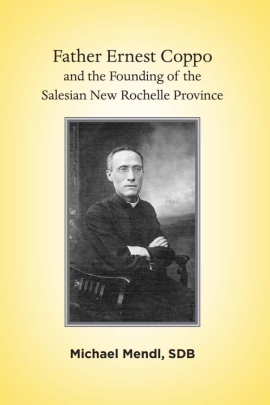Authored by Fr Michael Mendl, the text elicited unanimously positive opinions:
“Father Michael Mendl gathers into one place the present state of knowledge about the Salesians’ early history in New York City and on the East Coast of the United States, and a comprehensive narrative of its first leader, Father Ernest Coppo. He provides rich insights into individual men’s efforts to live out their Salesian vocations, and the community’s work to root itself in its East Coast ministry. This is a helpful study for Salesians, for comparison with other religious orders, and for scholars of American Catholicism, immigrant pastoral care, and church work in New York City neighborhoods” Mary Elizabeth Brown, Center for Migration Studies and Marymount Manhattan College.
“Father Mendl’s detailed research and thorough analysis has produced an important study of an important era in the growth not only of the Salesian Order, but also of the American Church itself. Ernest Coppo and his associates worked against great obstacles to serve that Church at the height of its immigration period, and especially in the greater New York area. That Italian Americans and other groups have remained connected to Catholicism in the United States is an accomplishment for which these pioneering Salesians deserve much of the credit. In today’s situation, in which the Church always seeks rebirth in the Holy Spirit, this book will provide insight for those who strive to see how it can happen once more. A solid story that deserves its telling” Thomas R. Murphy, SJ, Boston College.
“Reading the early history of the New Rochelle Salesian Province, by Fr. Michael Mendl, one cannot fail to be impressed by the zeal of the early Salesian pioneers who came to New York to support and minister to the massive Italian immigrant community driven to the USA by poverty and distress, and largely without the benefit of Italian clergy. The early Salesians like Fr. Ernest Coppo and his companions gave themselves unstintingly to preaching and gathering the immigrants into parish communities, helping them adapt to their very challenging new homeland. The challenge that the Salesians faced was how to develop their distinctive Salesian focus on young people in the face of the overwhelming pastoral needs of the Italian immigrant community. Fr. Mendl’s account carefully sets the context and by judicious use of archival material traces the early development of the Salesian work in the Eastern United States” Fr. John Dickson, SDB, Author of The Dynamics of Growth: The Foundation and Development of the Salesians in England.


